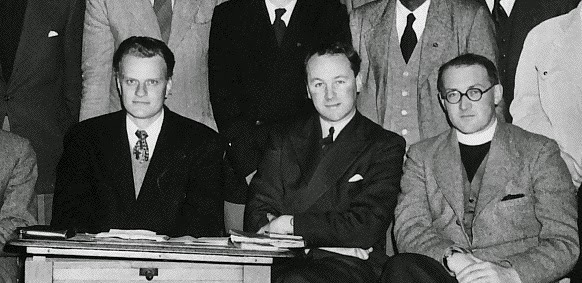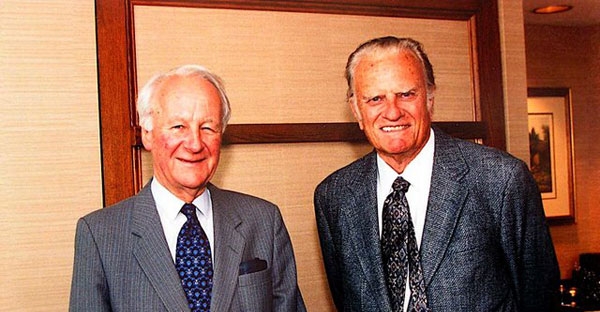
Billy Graham & John Stott
Brian C. Stiller, Jabez Berkley Reynolds, Leighton Ford, Mariano Di Gangi, and Selwyn Perley Belsher
HOW THE MOVEMENT BEGAN
in Canada and around the World
LAUSANNE MOVEMENT IN CANADA
Lausanne Canada was born out of missional friendships. In 1974, at the First Lausanne Congress, Rev. Mariano DiGangi was named chair of Lausanne Canada. On 28 July 1983, Brian C. Stiller, Jabez Berkley Reynolds, Leighton Ford, Mariano Di Gangi, and Selwyn Perley Belsher incorporated the Lausanne Committee for World Evangelization in Canada and served as its first directors.
Dr. Leighton Ford, a Canadian-American evangelist, author, and mentor, was programme chair for Lausanne ’74 and chaired the Continuation Committee from 1976 to 1992. Mentoring friendships helped catalyze the first Younger Leaders Gathering in Singapore in 1987. He chaired the Second Congress in Manila in 1989 and was named honorary lifetime chairman in 1992.
Dr. Brian C. Stiller chaired YLG Singapore ’87 and later led Youth for Christ Canada, the Evangelical Fellowship of Canada, and Tyndale University. Since July 2011 he has served as Global Ambassador for the World Evangelical Alliance.
From the 1980s onward, Canadian consultations and catalysts have influenced global conversations, on issues that have a strong Canadian connection such as diaspora mission and workplace. These advances grew through trusted cross-sector friendships that join scholars, practitioners, and pastors in shared witness.
Today, mission is from everywhere to everyone, including our workplaces and neighbourhoods. Our method remains missional friendships. We:
Connect people, ideas, and initiatives across regions and generations.
Catalyze collaborative action where alignment exists.
Curate Canadian insights for the global church and bring global insights home.
Collaborate with humility and integrity so the gospel is both lived and proclaimed.
This is the Canadian story within the spirit of Lausanne - rooted in friendship, focused on Jesus, and aimed at faithful witness together.
Missional Friendships are the Foundation of Lausanne
The story of the Lausanne Movement begins with a special friendship.
Learn more about Billy Graham and Lausanne: here.
In 1955, the evangelist Billy Graham was invited to lead a mission to Cambridge University with John Stott as his chief assistant. These two young men formed a lifelong friendship, which would later lead to the launching of the Lausanne Movement.
About twenty years after their friendship began, Billy Graham perceived the need for a global congress to reframe Christian mission in a world of political, economic, intellectual, and religious upheaval. He believed this could only happen if leaders from around the world gathered to unite in ‘the common task of the total evangelization of the world’.
Graham and Stott’s friendship was foundational for the First International Congress on World Evangelization in July 1974. Over 2,400 participants from 150 nations gathered in Lausanne, Switzerland, for what TIME magazine described as ‘a formidable forum, possibly the widest-ranging meeting of Christians ever held’.
John Stott
Learn more about John Stott and Lausanne: here.
From this Congress issued the biblical declaration that Billy Graham had hoped for, The Lausanne Covenant, with John Stott as its chief architect. The Covenant was to prove one of the most significant documents in modern church history, shaping evangelical thinking for the rest of the century.Throughout their lives, Billy Graham and John Stott gave peerless leadership to evangelicals around the world. We should not look for successors. Their joint work in establishing a movement that bound evangelistic passion with theological reflection, and orthodoxy with orthopraxy, has proven a watershed for evangelicals. To this day, world congresses, global gatherings, and issue-specific forums and consultations have continued to be convened in what Billy Graham called ‘the spirit of Lausanne’—a spirit of humility, friendship, prayer, study, partnership, and hope—the very spirit mirrored in his friendship with John Stott.






